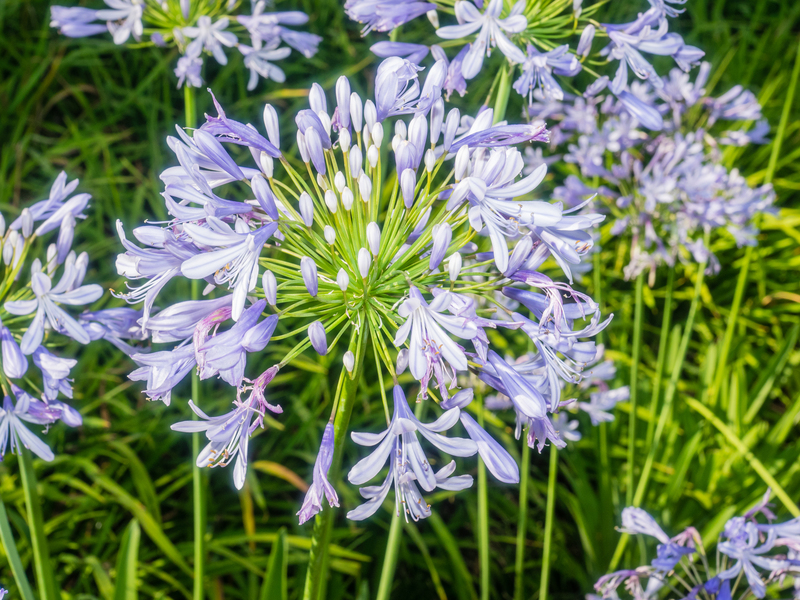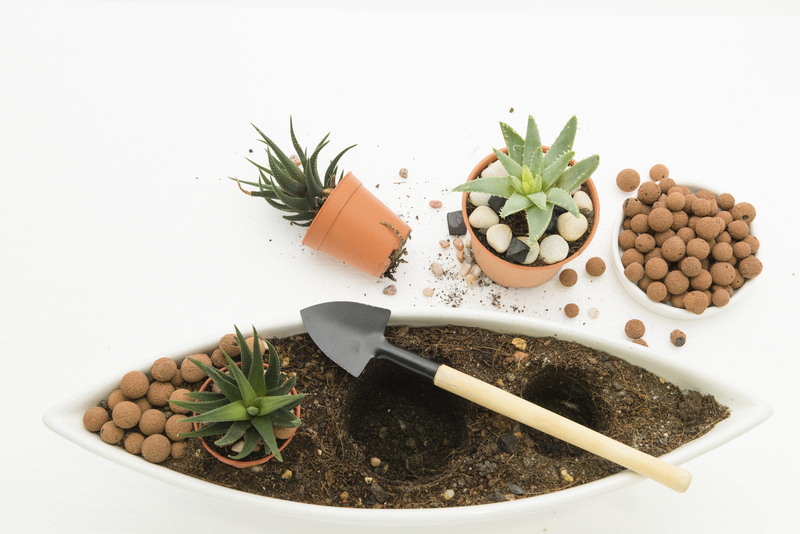Herb garden magic: cultivate health and flavor in your backyard
Posted on 01/06/2025
Herb Garden Magic: Cultivate Health and Flavor in Your Backyard
Imagine stepping outside your door and snipping fresh basil for your pasta or mint for a cup of tea. The joy of growing your own herbs goes beyond flavor--they have the power to transform your meals, boost your nutrition, and provide a peaceful oasis right in your yard. This comprehensive guide will unveil the secrets to creating a thriving backyard herb garden, ensuring you enjoy the magical health benefits and aromatic flavors of nature's green treasures.
Why Choose Backyard Herb Gardening?
A backyard herb garden is more than just pretty greenery. It's a source of fresh, organic herbs that can elevate your dishes and contribute to a healthier lifestyle. Here are some reasons why cultivating herbs at home is a rewarding pursuit:
- Enhanced Flavor: Freshly picked herbs pack more aroma and taste than store-bought alternatives.
- Health Benefits: Many herbs contain antioxidants, vitamins, and essential oils that support overall wellness.
- Cost-Effective: Growing your own herbs reduces grocery bills and waste.
- Eco-Friendly: Homegrown herbs have a smaller carbon footprint and require no packaging.
- Therapeutic: Gardening can lower stress and connect you with nature.
Let's explore the enchanting world of home herb gardens and how to unlock their full potential in your backyard.

Planning Your Magical Herb Garden
Choosing the Perfect Location
Herbs thrive in sunny locations with well-draining soil. When deciding where to establish your backyard herb garden, consider:
- Sunlight: Most culinary herbs need at least 6-8 hours of direct sunlight daily.
- Accessibility: Plant herbs near your kitchen for easy snipping and convenience.
- Soil Quality: Good drainage is essential. Consider raised beds, containers, or amend your garden soil with compost.
Selecting the Best Herbs for Outdoor Gardens
Not all herbs thrive in all climates. Start by choosing varieties that suit your local growing conditions and your culinary preferences. Here are some essential herbs for backyard gardens:
- Basil: Adds robust flavor to Italian and Southeast Asian dishes.
- Mint: Refreshing and easy to grow--perfect for teas and desserts.
- Rosemary: Woody flavor pairs well with roasted meats and vegetables.
- Thyme: Subtle, earthy flavor for soups and stews.
- Parsley: Rich in nutrients and a versatile garnish.
- Cilantro: Distinct taste for Latin and Asian cuisines.
- Sage: Fragrant leaves ideal for holiday stuffing and meats.
- Dill: Aromatic for pickles, fish, and salads.
- Chives: Mild onion flavor for garnishing potatoes and eggs.
- Lemon Balm: Sweet lemon scent, excellent for teas and desserts.
Mix and match based on your taste and garden space. Culinary herbs can also be grown alongside flowers and vegetables, boosting pollinator visits and deterring pests.
Designing Your Herb Garden for Beauty and Yield
Garden Layout Inspiration
The layout of your backyard herb haven can be as simple or elaborate as you like. Here are a few popular design ideas:
- Kitchen Proximity: A small raised bed or row of pots near your backdoor for quick access when cooking.
- Formal Herb Garden: Geometric patterns, such as circles or square beds divided by paths--beautiful and organized.
- Herb Spiral Garden: Build a spiral with stones or bricks to maximize space and create different microclimates for various herbs.
- Container Herb Gardening: Perfect for patios, balconies, or to keep invasive herbs (like mint) contained.
Companion Planting for Herbs
Certain herbs enhance each other's growth--and that of neighboring vegetables. Try these classic pairings:
- Basil & Tomatoes: Basil repels tomato pests and enhances flavor.
- Rosemary & Beans: Rosemary deters bean beetles.
- Dill & Cabbage: Dill attracts beneficial insects for the cabbage family.
- Chive & Carrots: Chives protect carrots from carrot flies.
Maximizing Yield in Small Spaces
Even with limited yard space, you can cultivate a bountiful herb crop. Try these creative tips:
- Vertical Gardening: Use wall-mounted planters or stacked pots to grow upwards.
- Hanging Baskets: Perfect for trailing herbs like thyme or oregano.
- Interplanting: Tuck herbs among vegetables and flowers in raised beds for biodiversity and beauty.
How to Grow a Thriving Backyard Herb Garden
Soil Preparation and Fertility
Healthy soil is the secret ingredient for magical herbs! Most herbs prefer slightly alkaline to neutral pH (6.0-7.5).
- Add compost or aged manure before planting to boost nutrients and improve soil structure.
- Avoid over-fertilizing--too much nitrogen can reduce flavor and oil production in herbs.
- Test your soil for pH and amend as needed with lime (to raise pH) or sulfur (to lower it).
Planting Techniques
Many herbs can be started from seeds, but some, like rosemary and mint, do better with cuttings or young plants. Follow these guidelines:
- Direct Seed: Sow seeds like parsley, cilantro, and dill directly in your garden in early spring or late summer.
- Transplants: Plant starter herbs from a nursery after the last frost--or root cuttings of mint in water for quick results.
- Spacing: Allow 12-18 inches between larger herbs and 6-8 inches for smaller varieties to ensure good air circulation.
Watering and Mulching
While herbs are generally low-maintenance, their water needs vary. Follow these tips:
- Water deeply but infrequently--allow soil to dry out between waterings, especially for Mediterranean herbs like rosemary, thyme, and oregano.
- Mulch lightly with organic material to retain moisture and suppress weeds.
- Avoid waterlogging--herbs hate soggy roots!
Pruning and Harvesting for Best Flavor
Frequent harvesting encourages bushier, more productive plants. Here's how to do it right:
- Pinch young tips of herbs regularly, especially basil and mint.
- Harvest in the morning after dew dries but before midday sun--oils are at their peak.
- Don't remove more than one-third of the plant at once to avoid stress.
Herbs and Their Wellness Benefits
Herbs are not just for seasoning--many contain potent health-protective compounds, vitamins, and minerals. Here are some highlights from popular home-grown herbs:
- Basil: Antioxidant-rich; contains anti-inflammatory eugenol which may support immune health.
- Mint: Aids digestion, soothes headaches, and freshens breath.
- Rosemary: Enhances memory, supports circulation, and is high in antioxidants.
- Sage: Traditionally used for sore throats and colds; may boost brain health.
- Parsley: Loaded with vitamin C, iron, and folate for immune and heart health.
- Thyme: Powerful antimicrobial properties; an effective cough and respiratory remedy.
- Cilantro: May help detoxify heavy metals and supports gut health.
Including a range of fresh herbs in your daily meals can provide a meaningful contribution to your overall wellness.
Creative Culinary Uses for Fresh Herbs
Transform Your Cooking
The flavor revolution starts in your backyard! Fresh herbs can make even the simplest meals magical. Try these culinary ideas:
- Herb-Infused Oils: Steep rosemary, thyme, or basil in good olive oil for homemade salad dressings and marinades.
- Fresh Pesto: Blend basil, parsley, or cilantro with garlic, olive oil, and nuts for vibrant sauces.
- Herb-Butters: Mix soft butter with chopped chives, dill, or sage for spreading on bread or melting over vegetables.
- Flavorful Garnish: Sprinkle freshly snipped parsley or chives on eggs, soups, and roasted meats.
- Herbal Teas: Brew mint, lemon balm, or chamomile directly from your garden for a calming drink.
Storage and Preservation
With a flourishing herb patch, you will have more than enough for daily meals. Preserve the bounty for seasoning all year long:
- Drying: Hang stems in small bunches in a dry, well-ventilated area; remove leaves and store in airtight jars.
- Freezing: Chop herbs and freeze in ice cube trays with water or oil for ready-to-use portions.
- Herb Salts or Vinegar: Infuse sea salt or vinegar with chopped herbs for gourmet gifts or kitchen staples.
Common Challenges and How to Overcome Them
Dealing with Pests Naturally
Even the most magical garden attracts some unwanted visitors. Combat them organically:
- Hand-pick pests or use a strong jet of water for aphids.
- Encourage beneficial insects (ladybugs, lacewings) by planting flowers nearby.
- Neem oil or insecticidal soap can control infestations without harming bees.
- Companion planting (e.g., basil with tomatoes) repels pests naturally.
Preventing Diseases
- Avoid overhead watering--water at the soil base to prevent leaf diseases.
- Practice crop rotation and remove any diseased leaves promptly.
- Space plants properly for airflow and monitor regularly.

Herb Garden Magic: Seasonal Care and Tips
Spring and Summer
Plant, prune, and enjoy abundant harvests during these warm, bright months. Keep an eye on water needs during hot spells.
Fall
- Harvest and preserve excess herbs.
- Mulch tender perennials (such as rosemary) to protect roots from frost.
- Sow cool-season herbs such as cilantro and parsley for autumn growth.
Winter
- Bring potted herbs indoors to a sunny window or under grow lights.
- Cut back dormant perennial herbs and clear plant debris.
Conclusion: Unlock the Magic of Your Backyard Herb Garden
The journey to herb garden magic is within your reach. Whether you have rolling turf or a small balcony, cultivating your own herbs brings health, flavor, and joy to everyday living. With vibrant greens and intoxicating scents, your backyard herb patch will become a source of inspiration in your kitchen and a sanctuary for well-being.
Start planting today--your magical, healthy, and flavorful oasis awaits just outside your door!
Frequently Asked Questions about Backyard Herb Gardens
- Can I grow herbs in the shade? Some, like mint, parsley, and chives, tolerate partial shade, but most prefer sun.
- How often should I water my herbs? Water deeply when soil is dry to a depth of one inch--overwatering can cause root rot.
- What are the easiest herbs for beginners? Basil, mint, parsley, and chives are forgiving and quick to grow.
- Can I grow herbs in pots? Absolutely--containers are ideal for patios, balconies, and keeping vigorous herbs in check.
- How do I keep my herbs productive? Regular harvesting, pinching, and avoiding heavy fertilization keeps herbs bushy and flavorful.
For even more tips on home gardening, subscribe to our Herb Garden Magic Newsletter and keep your journey flourishing!
Latest Posts
From Organic Clutter to Soil Enrichment
Handy Gardening Tools for Every Outdoor Connoisseur
Unlock the Potential of Your Hedges with Expert Trimming

